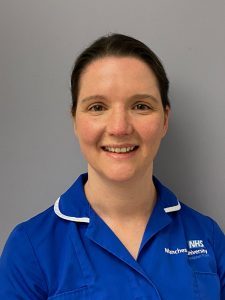International Day of the Midwife celebrates quality midwifery care around the world, and improving reproductive, maternal, newborn and children’s health, including through pioneering clinical research.
Together Samantha Ratcliffe and Sarah Lee jointly manage Manchester University NHS Foundation Trust’s (MFT) research midwifery team, based at Saint Mary’s Hospital. They share their experiences of leading clinical trials, and how MFT has invested in midwifery-led research.
 Samantha Ratcliffe, Research Midwife and Research and Innovation Matron for Manchester Royal Infirmary (MRI)
Samantha Ratcliffe, Research Midwife and Research and Innovation Matron for Manchester Royal Infirmary (MRI)
I consider myself very fortunate to be a research midwife and to work alongside 15 other passionate and dedicated research midwives across MFT. We all have a shared focus of improving the care and outcomes for the women and families through research and work hard each day to provide excellent care and important research to these women.
I am in a fortunate position to be able to provide high standards and continuity of antenatal care to women who are likely to experience high-risk pregnancies and provide them with opportunities to take part in cutting-edge research through our translational research clinics.
Quite often the research the women participate in won’t be of benefit to them in their current pregnancy, but they want to help other women have better outcomes from pregnancies in the future.
MFT has a long history of investing in midwifery-led research, and I am extremely proud to be a part of this. I have seen the research we deliver directly translate into standard NHS care here at Manchester, and across the UK and even globally. An example of this would be the MiNESS study which led to a reduction in stillbirth and the global ‘sleep on side campaign’. Another was the NIHR-funded PARROT trial, which has gone on to see the roll-out of the placental growth factor (PLGF) blood test into practice across Greater Manchester. This test speeds up the diagnosis of pre-eclampsia and helps to determine which women are at most risk of developing severe complications.
A number of our midwives here at MFT have also had the opportunity to deliver their own research, such as with Sue Thormber’s study on midwives’ experiences of influencing maternal and fetal position during labour, or have had opportunities to act as Principal investigator (PI) on studies – which means that they are the overall study lead at our Trust.
I have recently had the opportunity to be PI on a nationally prioritised study called PAN-COVID, which aims to understand how COVID-19 affects early pregnancy, fetal growth, prematurity and virus transmission to the baby. The study has spanned 13 countries and recruited over 8,000 women globally, and has recently published its preliminary findings.
Saint Mary’s Hospital (SMH) also has a Consultant Midwife, Dr Kylie Watson, who has dedicated research time as part of her role. Kylie has been working with Kimberley Farrant, Midwifery Research Fellow at SMH, to design and undertake a study investigating the maternity care experiences of women living in Central Manchester. The study has received funding from Manchester Academic Health Science Centre (MAHSC), and will focus on the experience of women living in high areas of deprivation and from Black, Asian and minority ethnic backgrounds in order to improve outcomes.
I would encourage anyone with a passion for improving the care and outcomes for women and their families in pregnancy to consider a future in research. The opportunities and the satisfaction are endless.
 Sarah Lee, Research Midwife Coordinator
Sarah Lee, Research Midwife Coordinator
I have worked as a research midwife for MFT since 2009 and am committed to improving pregnancy outcomes for the women of Greater Manchester. Together with Samantha, I am extremely proud to jointly manage the midwifery research team at MFT.
Since February 2019, I have been the PI on the ‘financial incentives for preventing postpartum return to smoking’ (FIPPS) trial. The first postpartum – meaning the period after birth and relating to the mother – study of its kind, it aims to assess if financial incentives – in the form of vouchers – can reduce the number of women going back to smoking 12 months after birth.
The study is funded by the Greater Manchester Combined Authority (GMCA) and provides women with shopping vouchers up to 12 weeks or 12 months postpartum, depending on which arm of the trial they are randomised to. Prior to birth, the Greater Manchester Smokefree Pregnancy Programme provides free nicotine replacement therapy to reduce the harm caused by smoking to the unborn baby, the woman, and her wider family. This in turn will reduce the cost to the NHS by reducing the number of acute and long-term health problems such as miscarriage, low birthweight, stillbirth, preterm birth, and sudden infant death while increasing the number of smokefree homes.
In my role as PI, I am responsible for the overall conduct of this research study. To be eligible, women need to have quit smoking in pregnancy after engaging with specialist midwives and midwifery support workers as part of the Greater Manchester Smokefree Pregnancy Programme. At the start of 2019, the entire smokefree pregnancy team were new to research. This meant I had to dedicate my time to ensure the team were fully trained in all areas of Good Clinical Practice (GCP) to protect the rights, safety, and wellbeing of study participants.
This effort has been rewarded as the dedication of the smokefree pregnancy team has helped overall smoking rates in pregnancy across the city region fall twice as fast as the national average, to a record low of 16.2 per cent in August 2019.
Although the COVID-19 pandemic paused recruitment to the study between March and June 2020, a total of 84 women have now been recruited at MFT – a recruitment rate of 74 per cent. This is an amazing achievement from a very dedicated team.
My work as a research midwife has given me the opportunity to provide antenatal care for many women and families in Manchester, whilst also being at the forefront of world-class research.
It is only through research that we will be able to improve patient care by finding new treatments and I would encourage everyone to get involved, both staff and patients.
For more of our updates on International Day of the Midwife, visit the @MFT_Research Twitter account.